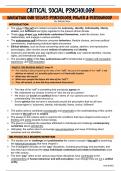By: Nikolas Rose
INTRODUCTION
• The value of the self and related concepts like autonomy, identity, individuality, liberty,
choice, and fulfilment are highly regarded in the present ethical climate.
• These ideas shape how individuals understand themselves, make life choices, form
relationships, and engage in various activities.
• The autonomous self influences consumer behaviour, lifestyle choices, and even political
commitments, emphasizing individual rights and powers.
• Ethical debates, such as those concerning same-sex couples, abortion, and reproductive
technologies, often revolve around notions of autonomy and identity.
• Autonomy and identity also play significant roles in conflicts over national identities, minority
rights, and international disputes.
• The prevailing ethic of the free, autonomous self is fundamental to modern self-conception,
experience, and self-evaluation.
WHAT IS THIS READING ABOUT? (page 5)
⇒ This reading is about exploring the idea of the “self”: because the concept of the “self” is not
obvious or natural, but actually quite recent and historically located.
⇒ What does this mean?
⇒ What were people like before this idea of the “self”?
⇒ They still existed, so how did they understand themselves?
⤷ The idea of the “self” is something that everybody agrees on.
⤷ We understand our choices in terms of “who we are as a person”.
⤷ We enact our social and political lives in terms of “our opinions and ways of
understanding” the world around us.
⤷ Every opinion that we have is structured around the assumption that we all have
access/rights to “autonomy, identity, individuality, liberty, choice, fulfilment”.
• The author aims to contribute conceptually and empirically to the understanding of this current
concept of the self and its origins.
• The essays in this volume seek to examine the conditions that have shaped current ways of
thinking and acting towards human beings.
• The goal is to evaluate the capacities attributed to individuals and challenge contemporary
certainties about self-identity.
• Ultimately, the author aims to encourage new perspectives and ways of thinking about
ourselves and our identities.
SELFHOOD AS A MODERN INVENTION
• The studies aim to challenge and problematize the current concept of the self by examining
the historical processes that have shaped it.
• The investigation focuses on the "psy" disciplines, including psychology and psychiatry, and
how they have influenced the ways individuals understand and relate to themselves since
the 19th century.
• The term "psy" refers to the various ways these disciplines have contributed to the
understanding of human behaviour and self-conception, even though they are not a unified
entity.
TJW NOTES
, • The essays argue that "psy" has played a significant role in constructing the contemporary
regime of the self, while also being subject to disciplinary influences itself.
• The author is not attempting a comprehensive history of psychology but rather examines the
vocabularies, explanations, and techniques of "psy" that contribute to the particular way
individuals understand and relate to themselves and others.
• The primary focus is on understanding how the contemporary apparatus for “being human”,
including concepts like identity, selfhood, autonomy, and individuality, has been constructed.
• The work is described as "critical history", seeking to explore the conditions that have led to
the current state of the self and to challenge the seemingly inescapable nature of the prevailing
regime of the self.
⤷ a way of understanding selfhood in a particular way.
⤷ This selfhood comes with rights and obligations.
⤷ He is questioning the certainty that we have about our selfhood, and where this view of
the self comes from, and what/whose interests it might serve.
• The goal is to shed light on the burdens, illusions, acts of domination, and self-mastery
that accompany the capacities and liberties attributed to the modern individual.
WHAT IS A “SELF”?
⇒ The self is the relationship of an individual’s own being, knowledge and values. Self relates the
experiences of one's inner and outer living in presence.
⇒ The first-person perspective distinguishes selfhood from personal identity.
DESCRIBING A MODERN SELFHOOD:
⇒ It is someone who understands themselves, thinks of themselves as an individual (i.e.
separate from other people), can make decisions and act on them, can think about things,
can act of their own free will, has a unique history, has a family heritage, has personal
experiences which have shaped us and contributed to “who we are”, to our “thoughts,
attitudes, beliefs and values”.
WHAT ARE THE ASSUMPTIONS UNDERLYING PERSONHOOD?
⇒ What do we need to know about ourselves and others in order for life to make sense?
∘ E.g. we assume that we can all interpret sensory information in the same way.
∘ We assume that other people have feelings that are similar to ours.
∘ We assume that other people can reason, that other people have thoughts.
∘ We assume that other people want the same things we want (love, security, etc.).
∘ We assume that other people see us in the same way we see them.
∘ We assume that others understand their experiences the same way we understand ours.
∘ We assume that other people can want things, and go out and achieve them.
∘ We assume that we all want to feel fulfilled.
⇒ We use these assumptions as the basis for many of our actions.
• Addresses the question of the self and its related terms (autonomy, identity, individuality,
liberty, choice, fulfilment) in contemporary Western Europe and North America.
• The regime of the self in these regions is considered historically and geographically unusual
and heterogeneous, localized in distinct practices with different presuppositions about
individuals.
• Despite the diversity, there is a common normativity in the regulative ideals concerning
individuals in various practices, emphasizing inner psychology, self-realization, self-
esteem, and self-fulfilment.
• Aims to establish the strengths and limits of the hypothesis about the common normativity and
to explore the diverse places, practices, and problems from which the contemporary notion of
the self has emerged.
TJW NOTES





